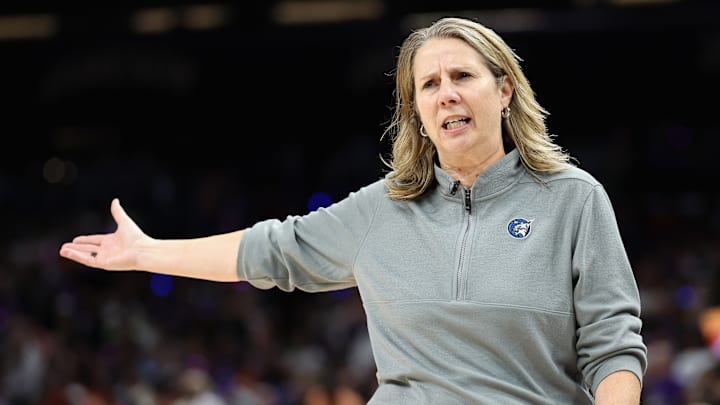If there’s one thing coaches can agree on this postseason, it’s that they don’t like the officiating. Stephanie White claimed that foul calls made it impossible for her team to find a rhythm in Game 2 against the Aces, and Becky Hammon said that the physicality was “out of control.” Cheryl Reeve took the complaints about the referees to another level in a postgame monologue after the Lynx lost Game 3 to the Mercury. It was another close game, but the Mercury managed to create some separation by outscoring the Lynx 21-9 in the fourth quarter.
Reeve already received a technical foul halfway through the second quarter, but things escalated with about 21 seconds left in the fourth quarter. Alyssa Thomas stole the ball from Napheesa Collier, who suffered an injury that is currently believed to be a fracture, according to Reeve’s postgame press conference, and could have major implications for the Lynx’s title hopes. Reeve thought a foul should have been called on the play and stormed onto the court when nothing was called. She received a second technical foul and was ejected from the game.
After the game, Reeve spoke about the officiating. “One of the best players in the league shot zero free throws. Zero. And she had five fouls. Got her shoulder pulled out and finished the game with her leg being taken out and probably has a fracture,” Reeve said. That sort of criticism isn’t new, but Reeve was far from done.
“If this is what our league wants, okay,” Reeve added. “But I want to call for a change of leadership at the league level when it comes to officiating. It’s bad for the game. The officiating crew that we had tonight, for the leadership to deem those three people semifinals playoff worthy is f---ing malpractice.”
Cheryl Reeve’s complaints aren’t an isolated incident
Frustration with the officiating isn’t a postseason phenomenon. Players and coaches have been vocal about inconsistent officiating and missed calls all season long and well before this year. Even big-time names like Caitlin Clark, who received a fine for some social media comments earlier in the playoffs, entered the conversation.
The fact that many referees only see the WNBA as a stepping stone to a better-paying, more secure job is no secret. That, in turn, leads to many excellent referees leaving the WNBA for opportunities in the NBA, which leaves the WNBA with a high turnover rate and little consistency and experience in its officiating ranks. While this is not a new phenomenon, the league’s rising popularity has caused more people to pay attention to it, especially after last year’s finals when a controversial foul call sent Game 5 between the Lynx and Liberty—the most-watched finals game in 25 years—to overtime. Reeve and many fans believed that the game, and subsequently the championship, had been stolen from the Lynx.
Addressing the officiating issue is one of many adjustments the WNBA will have to make as the league continues to grow. Much of the Lynx’s loss came down to the offense stalling in the fourth quarter, but Reeve still makes a valid point. The WNBA’s officiating system would undoubtedly benefit from some changes.
